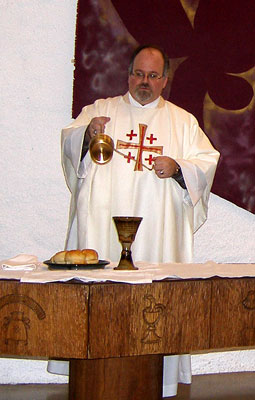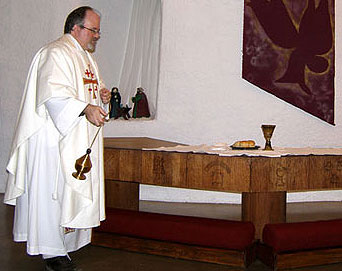Let Our Prayers Rise:
The Use of Incense In The Church
By: Dr. Gregory S. Neal

However, among most Protestant Christians the use of incense in public worship is not as common as it is among our sisters and brothers in the Roman Catholic and Eastern Orthodox traditions. And, so, it is understandable that people want to know the historical, Biblical, and theological meaning of its use in worship. There are many references in the Hebrew Bible (the “Old Testament”) to the use of incense (and, particularly, frankincense) in Jewish worship. In the sanctuary of the Tabernacle, and in the Temple in Jerusalem, an altar was provided for the burning of incense, directions were given for how the incense was to be prepared from frankincense and other gums and resins, and how it was to be offered up in prayer and praise as part of the congregation’s worship. Its use is described in the Psalms and in Isaiah, Jeremiah, and Malachi, as well as in the Gospel account in Luke of the vision given to Zechariah, who was a priest “offering incense in the temple of the Lord” when he received the promise from God that a son, who would later become known as John the Baptist, would be given to him and his wife, Elizabeth. (Luke 1:8-11)


- Our collected prayers and praises, rising to God like the smoke from the censer.
- The mystical Real Presence of Jesus Christ through the power of the Holy Spirit.
- The Grace of God, which God pours into our souls as incense pours fragrance throughout the Sanctuary.
When offered as a means of grace in worship, incense can serve as a reminder that, even when Christ’s presence is intangible, wispy, and even distant, nevertheless God is with us. Truly, this is the message of Christmas: “Emmanuel … God with us!”
© 2008 Dr. Gregory S. Neal
All Rights Reserved

The Reverend Dr. Gregory S. Neal is the Senior Pastor of Grace United Methodist Church in Des Moines, Iowa, and an ordained Elder of the Iowa Conference of The United Methodist Church. A graduate of Southern Methodist University, Duke University, and Trinity College, Dr. Neal is a scholar of Systematic Theology, New Testament origins, and Biblical Languages. His areas of specialization include the theology of the sacraments, in which he did his doctoral dissertation, and the formation and early transmission of the New Testament. Trained as a Christian educator, he has taught classes in these and related fields while also serving for more than 35 years as the pastor of United Methodist churches in North Carolina, North Texas, and Iowa. He is married to Kade Rogers.
As a popular teacher, preacher, and retreat leader, Dr. Neal is known for his ability to translate complex theological concepts into common, everyday terms. His preaching and teaching ministry is in demand around the world, and he is available for public engagements. He is the author of several books, including Grace Upon Grace: Sacramental Theology and the Christian Life, which is in its second edition, and Seeking the Shepherd's Arms: Reflections from the Pastoral Side of Life, a work of devotional literature. Both of these books are currently available from many book stores, including Cokesbury, Barnes And Noble, and Amazon.
As a popular teacher, preacher, and retreat leader, Dr. Neal is known for his ability to translate complex theological concepts into common, everyday terms. His preaching and teaching ministry is in demand around the world, and he is available for public engagements. He is the author of several books, including Grace Upon Grace: Sacramental Theology and the Christian Life, which is in its second edition, and Seeking the Shepherd's Arms: Reflections from the Pastoral Side of Life, a work of devotional literature. Both of these books are currently available from many book stores, including Cokesbury, Barnes And Noble, and Amazon.